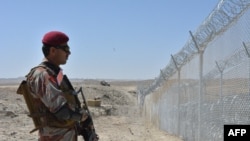Senior Pakistani military and intelligence officials told members of Parliament during a closed, eight-hour briefing Thursday that they are losing influence over the Taliban and building up border defenses for fear of increased violence in neighboring Afghanistan once the U.S. withdrawal is complete.
Lieutenant General Faiz Hameed, director general of Inter-Services Intelligence, gave the briefing, with army chief General Qamar Javed Bajwa on hand to answer questions.
They told the parliamentary committee that Pakistan was trying to persuade the Taliban to negotiate a settlement to the conflict, but the country’s influence is waning, according to a statement from Pakistan’s Information Ministry and VOA sources inside the meeting.
They also said Pakistan has fenced 90% of its border with Afghanistan to shield it from an increase in violence once U.S. and NATO forces are gone.
Pakistan is expecting millions of Afghan refugees to arrive at its border if violence in Afghanistan increases or the situation deteriorates into a civil war. The country already hosts nearly 3 million refugees, some of whom have been living here since the 1980s when the then-Soviet Union invaded Afghanistan.
Subsequent decades of conflict, in particular the civil war of the 1990s post-Soviet withdrawal, sent millions seeking shelter into nearby Iran and Pakistan.
Kashmir included in briefing
While relations with neighbor India, in particular the dispute over Himalayan region Kashmir, were also on the agenda of Thursday’s briefing, most of the time was spent discussing Afghanistan.
The private briefing was requested by senior opposition leaders who wanted the country’s national security establishment to lay out for the Parliament the country’s policies on the regional situation.
Foreign Minister Shah Mahmood Qureshi told local channel ARY that Thursday’s discussion on Afghanistan was “frank and comprehensive” and the other issues were to be discussed in a future briefing.
A day earlier, Pakistani Prime Minister Imran Khan told Parliament the country could be a “partner in peace” with the United States but not partners in the conflict, and reiterated his stance that his government would not provide the U.S. bases for counterterrorism strikes in Afghanistan.
In his statement announcing the withdrawal of U.S. forces from Afghanistan, President Joe Biden said his administration would “reorganize our counterterrorism capabilities and the substantial assets in the region to prevent reemergence of terrorist — of the threat to our homeland from over the horizon.”
Since then, U.S. diplomats have been in conversation with several countries in the region, including Pakistan, for help with counterterrorism needs, including providing bases or facilities that could host drones or other aircraft to be used for counterterrorism strikes.
U.S. offers warning
The U.S. intelligence community has warned that after the withdrawal of forces from Afghanistan, scheduled to be complete by September 11, 2021, counterterrorism would become difficult.
"The U.S. government's ability to collect and act on threats will diminish. That's simply a fact,” CIA Director Bill Burns told lawmakers in April.
However, he also acknowledged that the ability of terrorist groups in the region, like local affiliates of al-Qaida or Islamic State, lacked the capacity to attack the U.S.






